Lifestyle
May We Introduce Sandra, Mrs Average German
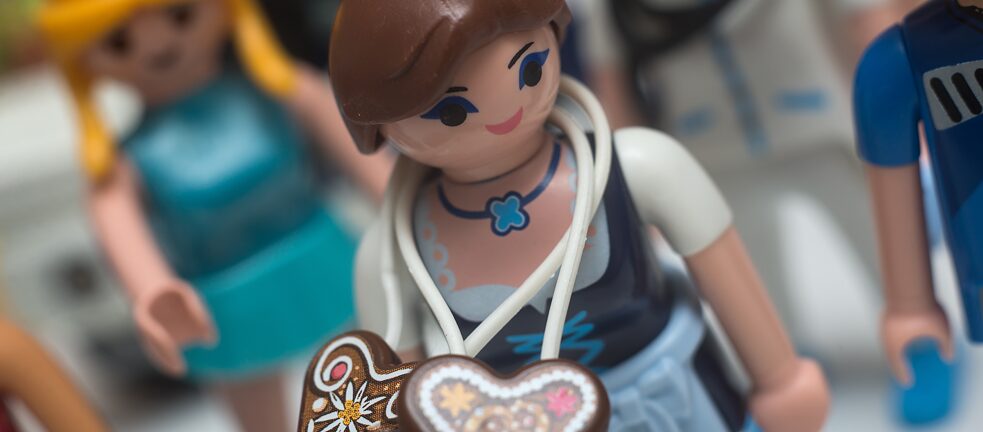
How do the Germans live and work, what are their favourite things? We’ve taken a close look at statistics about the Germans and their life models to find the German prototype.
By Alina Schwermer
Germany is famous for being the land of the Thomas principle: it’s run by middle-aged white men named Thomas, who in turn employ another Thomas. But the average German is actually a woman. Forget Thomas, meet Sandra, Germany’s average citizen. You’re sure to have come across her already, at the hairdresser or in Lidl, even though the encounter might by nature have been really mundane. Was it in Fürth? Was it in Moers? Or maybe it was actually in Eisenach? Like 41 per cent of Germans, Sandra lives in an area of medium population density, which means in a moderately sized city in rural surroundings, or a small town. She’s 45 now.
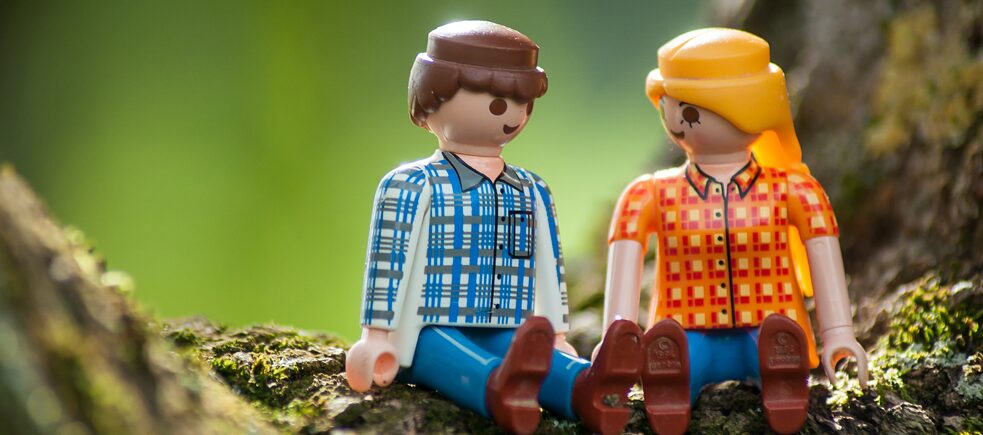 She moves into a pretty little family home in the suburbs with her husband Michael.
| Photo (detail): © Adobe
Sandra belongs to the generation that enjoyed the full benefits of the second women’s movement: she has Abitur (Germany’s higher education entrance qualification). But university after that was too much of a good thing after all, like 33 million other Germans she preferred to do an apprenticeship instead. And she chose the most popular apprenticeship subject for German women in the mid-nineties: retail saleswoman. But she doesn’t have to twiddle her thumbs as a food aisle employee at Karstadt for too long, because Michael enters her life. She moves into a pretty little family home in the suburbs with him. Admittedly at least a quarter of their income goes on rent – because contrary to the German home-building cliché, the majority of Germans do not live in a property of their own. And then of course there’s the cost of having children.
She moves into a pretty little family home in the suburbs with her husband Michael.
| Photo (detail): © Adobe
Sandra belongs to the generation that enjoyed the full benefits of the second women’s movement: she has Abitur (Germany’s higher education entrance qualification). But university after that was too much of a good thing after all, like 33 million other Germans she preferred to do an apprenticeship instead. And she chose the most popular apprenticeship subject for German women in the mid-nineties: retail saleswoman. But she doesn’t have to twiddle her thumbs as a food aisle employee at Karstadt for too long, because Michael enters her life. She moves into a pretty little family home in the suburbs with him. Admittedly at least a quarter of their income goes on rent – because contrary to the German home-building cliché, the majority of Germans do not live in a property of their own. And then of course there’s the cost of having children.
One or Two Children Are Part of the Deal
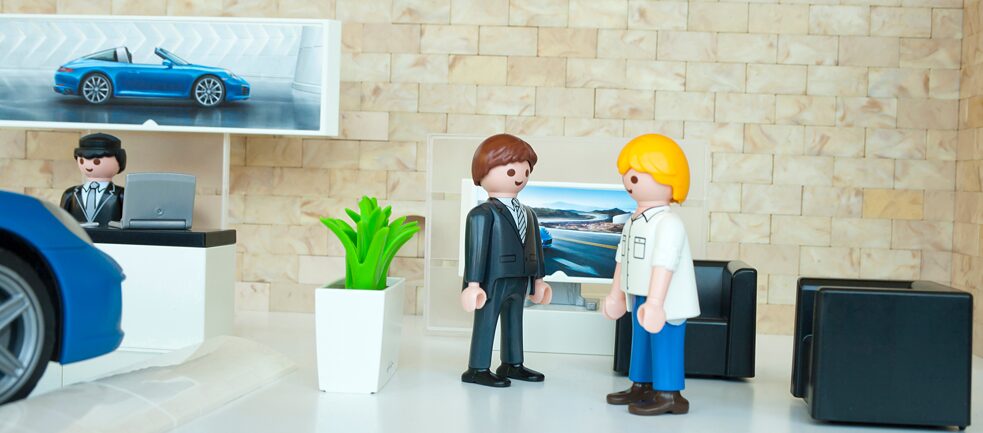 Michael continues to work full-time, Sandra’s been in part-time employment since the birth of her children. Of course gender differences don’t come into it.
| Photo (detail): © Adobe
Two children, reckons Sandra, are an essential part of life’s deal. Leon and Marie, that’s what people were calling their kids in the 2000s. She waited a while before having children: she was 29 when she had Leon, and 32 with Marie. And because it’s the right thing to do and it’s nicer for the kids, she and Michael got married when she was 32 as well – at a register office, she doesn’t have a faith. Every third marriage ends in divorce, so Sandra’s been lucky again in that respect. But everyday chores take up a huge amount of time. The thing is, Sandra takes care of most of the household tasks, which takes over four hours a day – Michael on the other hand invests a good two and a half hours. Sandra spends twice as much time cooking and cleaning, is almost solely responsible for the washing and ironing, while Michael does the handyman jobs almost entirely himself. Of course gender doesn’t come into it, it just worked out like that. And then there’s work: Sandra still works on a part-time basis, Michael’s in full-time employment.
Michael continues to work full-time, Sandra’s been in part-time employment since the birth of her children. Of course gender differences don’t come into it.
| Photo (detail): © Adobe
Two children, reckons Sandra, are an essential part of life’s deal. Leon and Marie, that’s what people were calling their kids in the 2000s. She waited a while before having children: she was 29 when she had Leon, and 32 with Marie. And because it’s the right thing to do and it’s nicer for the kids, she and Michael got married when she was 32 as well – at a register office, she doesn’t have a faith. Every third marriage ends in divorce, so Sandra’s been lucky again in that respect. But everyday chores take up a huge amount of time. The thing is, Sandra takes care of most of the household tasks, which takes over four hours a day – Michael on the other hand invests a good two and a half hours. Sandra spends twice as much time cooking and cleaning, is almost solely responsible for the washing and ironing, while Michael does the handyman jobs almost entirely himself. Of course gender doesn’t come into it, it just worked out like that. And then there’s work: Sandra still works on a part-time basis, Michael’s in full-time employment.
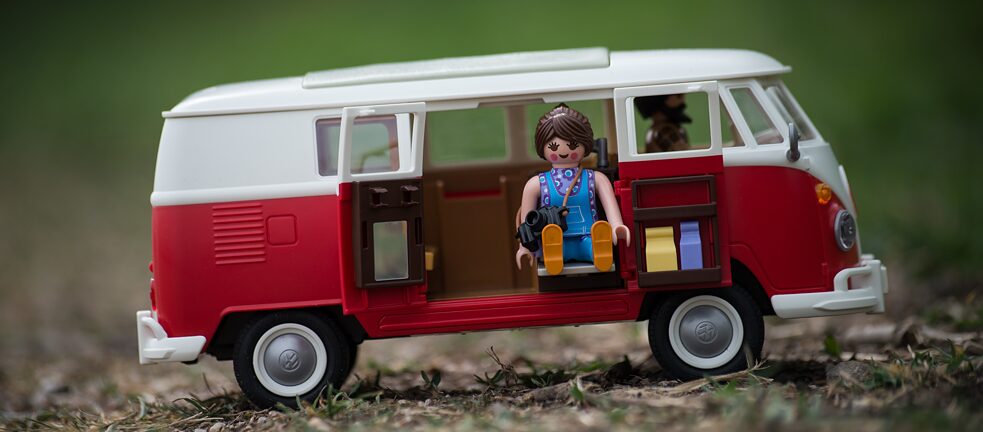 A ten-day break in summer is the ultimate way to relax: Germany is the nicest place, but Spain or Italy may sometimes be options too.
| Photo (detail): © Adobe
And yet things aren’t so bad for them. One in six Germans is at risk of poverty nowadays, one person in every seven is unable to afford holidays, so Sandra’s doing okay there. They have enough money for day-to-day family living, and they can even stretch to a ten-day break in summer. And she doesn’t want to travel far afield anyhow, after all Germany is the nicest place to be. Normally Sandra und Michael take the children on holiday to the North Sea or Baltic coast, for a beach holiday and maybe a museum visit – because that’s what people do. But they have been to Tuscany before, and of course they’ve visited Mallorca. A trip overseas is not one of life’s necessities.
A ten-day break in summer is the ultimate way to relax: Germany is the nicest place, but Spain or Italy may sometimes be options too.
| Photo (detail): © Adobe
And yet things aren’t so bad for them. One in six Germans is at risk of poverty nowadays, one person in every seven is unable to afford holidays, so Sandra’s doing okay there. They have enough money for day-to-day family living, and they can even stretch to a ten-day break in summer. And she doesn’t want to travel far afield anyhow, after all Germany is the nicest place to be. Normally Sandra und Michael take the children on holiday to the North Sea or Baltic coast, for a beach holiday and maybe a museum visit – because that’s what people do. But they have been to Tuscany before, and of course they’ve visited Mallorca. A trip overseas is not one of life’s necessities.
Plenty of TV and Some Sports
The family diary runs to a tight schedule, but Sandra does manage to find a bit of me-time. She spends 20 minutes a day in her voluntary role as treasurer of the local allotment society, 40 minutes on social contacts, and at least an hour on sports and hobbies. Germany might consider itself to be the nation of soccer, but it’s only in tenth place in the list of favourite sports. Sandra enjoys cycling, goes to Zumba (to improve her figure) and sometimes swims as well. But her favourite pastime by far is television. While the youngsters are on social media, Sandra mainly watches ARD and ZDF – the TV’s on for three and a half hours a day in her house. Art and music fare somewhat worse of course, with a daily average of three minutes. She goes to bed at 10.30 pm sharp – eight and a half hours sleep are a must for her.
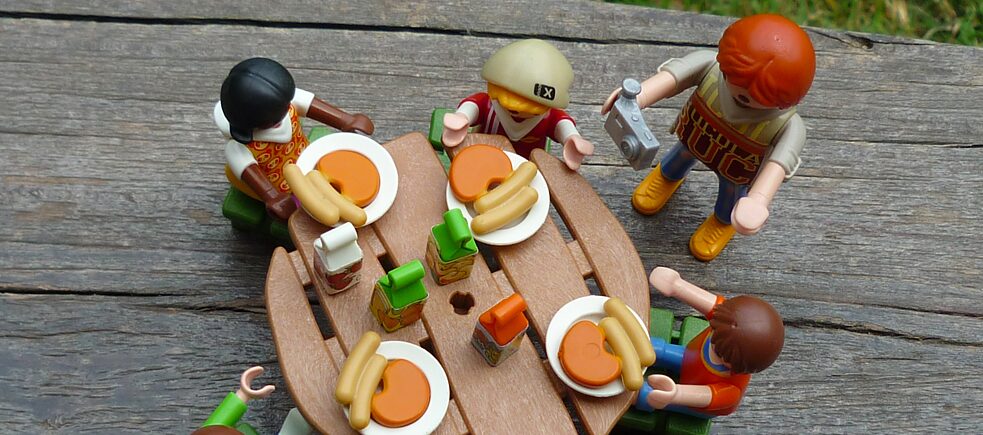 Sandra’s family has been eating more healthily lately. However her favourite meal is still Currywurst with fries – or doner kebab.
| Photo (detail): © Adobe
Now the children are heading towards adulthood – of course they attend the selective-entry Gymnasium, like 65 per cent of the children of Abitur certificate-holders. Only six per cent of children whose parents went to a Hauptschule managed this. Leon might want to study business or law. Now that she has more time, Sandra feels she should be cooking healthier meals sometimes. She consumes 82 kilograms of grain-based products annually, which is significantly higher than past years, as well as far more frozen vegetables and around a third more processed foods compared with ten years previously. Instead of that German classic, the potato – of which she still eats 57.9 kilograms a year – she tends to reach increasingly for ready potato products like crisps and fries. After all, her favourite meal is Currywurst, or curried sausage, with fries. But these days she enjoys doner kebabs as well. Sandra’s been eating more healthily lately: less alcohol, less meat, and more fruit. Her favourite fruits are a mixture of local German and global produce: apples and bananas.
Sandra’s family has been eating more healthily lately. However her favourite meal is still Currywurst with fries – or doner kebab.
| Photo (detail): © Adobe
Now the children are heading towards adulthood – of course they attend the selective-entry Gymnasium, like 65 per cent of the children of Abitur certificate-holders. Only six per cent of children whose parents went to a Hauptschule managed this. Leon might want to study business or law. Now that she has more time, Sandra feels she should be cooking healthier meals sometimes. She consumes 82 kilograms of grain-based products annually, which is significantly higher than past years, as well as far more frozen vegetables and around a third more processed foods compared with ten years previously. Instead of that German classic, the potato – of which she still eats 57.9 kilograms a year – she tends to reach increasingly for ready potato products like crisps and fries. After all, her favourite meal is Currywurst, or curried sausage, with fries. But these days she enjoys doner kebabs as well. Sandra’s been eating more healthily lately: less alcohol, less meat, and more fruit. Her favourite fruits are a mixture of local German and global produce: apples and bananas.
All this could go on for ever, but even Sandra’s life has to come to an end one day. Before her death she’ll be a widow for a while: her life expectancy is around 84 years, while Michael’s is only 79 years. What will she die of? It’s likely to be heart trouble.
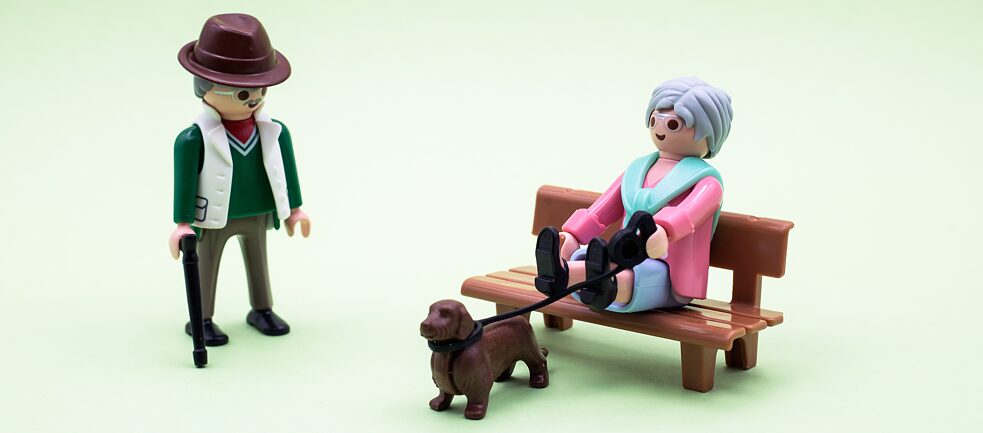 Sandra will spend her final days living alone again: her beloved Michael dies shortly before his 80th birthday – while she has another five years of life left herself.
| Photo (detail): © Adobe
Sandra will spend her final days living alone again: her beloved Michael dies shortly before his 80th birthday – while she has another five years of life left herself.
| Photo (detail): © Adobe